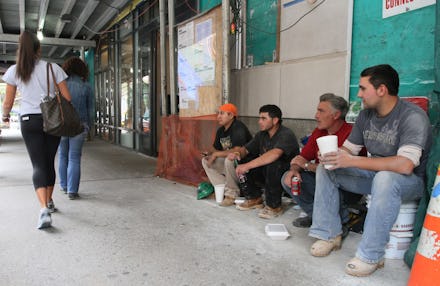The Next Time Someone Says Catcalling Is a Compliment, Show Them This

It's sadly no secret that many women around the world fear for their safety in public, but a new report has revealed that a startling number experience street harassment from an early age — and that plenty of men do, too.
The national report, conducted by the nonprofit organization Stop Street Harrassment (SSH), is sure to burst the bubble of those who still somehow insist that catcalling is a compliment. The report found that harassment adversely affects a disproportionate number of women, people of color and LGBT individuals, and can leave harassees feeling frightened, angry and violated.
It's time to start taking this issue seriously as an impediment to equality.
Image Credit: Stop Street Harassment
According to the report, which surveyed 2,000 people and conducted 10 focus groups, nearly two-thirds of women (65%) have experienced street harassment, with a frightening 41% experiencing aggressive forms including touching, following, flashing or being forced to do something sexual. While both men and women reported harassment, persons of color, members of the LGBT community and those with lower incomes — basically anyone other than straight, rich, white guys — reported the highest rates.
Image Credit: Stop Street Harassment
The report also found that exactly half of men and women were harassed by age 17, and 68% of women and 49% of men said they were concerned that the incident would escalate. Men did the overwhelming majority of the harassing.
Twenty-five percent of men experienced harassment as well, but, as Slate's Amanda Hess points out, "[T]he ubiquity of the phenomenon serves to reflect the toxic power structures inherent in American society — not provide evidence of an equal-opportunity offense."
Men who identified as gay, bisexual or transgender experienced more harassment than did heterosexual men, typically in the form of homophobic or transphobic slurs. Men who did not publicly appear masculine enough were often targeted, with one man being threatened with rape for carrying a pink umbrella, and another, who paints his nails, saying he tries to "butch" himself up before taking certain bus lines.
Image Credit: Stop Street Harassment
SSH defines street harassment as "unwanted interactions in public spaces between strangers that are motivated by a person's actual or perceived gender, sexual orientation, or gender expression." It includes verbal harassment in addition to flashing, following, groping and rape. Unlike the harassment sometimes experienced at school or work, there are few legal recourses available to victims.
But the biggest roadblock to curbing street harassment is the assumption that its most common form (things like honking, whistling and telling women to smile) is not only benign, but flattering. When women complain about this everyday sexism they're typically told to take it as a compliment or that they'll "miss the attention" when they're older.
The reality is that street harassment has nothing to do with making the harassee feel good, and everything to do with making the harasser feel powerful. These invasive comments affirm an attitude that men are entitled to publicly evaluate women's bodies and tell them what to do ("Let me look at you!"), and reinforce harmful, already prevalent assumptions that women's worth is related to their ability to please men. Street harassers do not catcall for the victim's benefit: A separate survey conducted by the nonprofit Hollaback! found that the overwhelming majority of women felt angry (85%), annoyed (78%), nervous (80%) and disgusted (72%) by this supposedly complimentary treatment. Frankly, it's pretty dehumanizing to have someone speak to your butt rather than your face.
Things are changing, albeit slowly. Projects like Tatyana Fazlalizadeh's Stop Telling Women to Smile seek to tackle the notion of street harassment as complimentary, and hundreds rallied at an International Anti-Street Harassment Week in April. Hollaback! has also worked with New York City lawmakers in the creation of their smartphone app, which allows victims to report street harassment where and when it happens.
Image Credit: Stop Telling Women to Smile via Facebook
Nevertheless, SSH founder and report author Holly Kearl echoed the disturbing recent study that found young women view sexual violence as commonplace when she told ThinkProgress, "Most youth have no idea what to do about it and many don't even know it is wrong because it seems so normal."
The good news? Almost every person (91%) in SSH's report believed that stopping street harassment is, in fact, possible. SSH includes a list of recommendations as to how leaders can help.